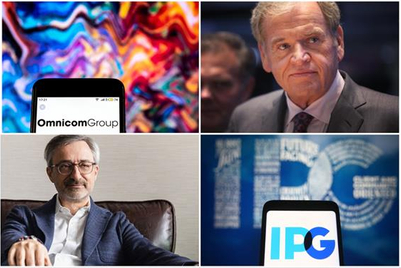
Two former Accenture Song executives have left the consultancy industry to develop a commerce offering within IPG that will bring creatives and brand experts into commerce development.
The Creative Commerce Labs is being spearheaded by Roald van Wyk, who has been banging the drum for commerce to be more creative since founding a brand experience commerce team within Accenture Song in 2020.
Van Wyk was hired in May by Jeriad Zoghby, who joined IPG as chief commerce strategy officer in January after previously leading global omnichannel commerce for Accenture Song, the marketing communications arm of consulting giant Accenture.
Both Van Wyk and Zoghby believe that existing commerce solutions focus so heavily on building technology infrastructures and achieving performance KPIs that creative is often treated as an afterthought.
“Too often commerce starts with a tech discussion, and creative is treated as a separate thing. You can have great technology and great capabilities, but the inspiration isn't there,” Zoghby told Campaign US.
“It is basically putting wrapping paper on an old idea, instead of going, ‘well, given all this new stuff, what would be the new idea?’”
Van Wyk said the genesis of the creative commerce approach he has developed came from a pitch he attended as part of Accenture six years ago, when he noticed that no one mentioned brand or storytelling. “It was very functional, very performance-based, very cold,” he said.
It’s an approach that overlooks the importance of consumer experience and the importance of having a cohesive brand identity, he believes.
“I think that's reflected in the commerce experience day-to-day — the sites and the experiences are very functional, they are very well thought out, but someone forgot to invite the brand to show up,” Van Wyk said.
“I compare it to the early days of social media when we just shoved stuff into Instagram and Facebook and it looked terrible,” he added.
A focus on metrics plays a part in this — commerce is traditionally seen as a performance marketing channel to drive short-term sales rather than to build brand affinity.
The functional approach to commerce is also driven by organizational silos, Zoghby said. “For a lot of clients, you have a commerce team that sits in sales, you have brand and creative sitting in the marketing organization, and analytics and production somewhere else. Trying to bring that whole commerce perspective together is challenging.”
The Creative Commerce Labs is intended to act as a forum for IPG’s creatives to develop ideas alongside key commerce platforms and clients so that creative is “part of the conceptualization, not on the back end,” Zoghby said.
The agency hopes that by bringing platforms such as Amazon into creative discussions, it can push the boundaries of what is possible rather than sticking to existing ad formats.
“A lot of times we have great ideas and by the time we speak to an Amazon or a TikTok or an Instagram, it's too late. It's that old model of handing it to them versus creating it together, building it and experimenting,” said Van Wyk.
With competition in commerce heating up, the platforms are “very open to being very creative for the first time,” Zoghby said.
The goal is to build commerce strategies rooted in cultural insights that tap into the full breadth of capabilities that platforms offer. An example is FCB Canada’s recent campaign for Voilà, which used TikTok insights to identify recipe trends that would drive consumers to use the food delivery service. The “Trending 2 Table” campaign won Gold in the 2023 Clio Awards.
“If you look at some of these emerging media platforms like Amazon, you have a full funnel media ecosystem that includes live TV, streaming, TV, social, podcast, gaming, all the way down to physical and digital retail. But as industry people, we think of Amazon as the place we shop and we often try to force old ideas onto new architecture. What are the use cases we've never thought of?” said Zoghby.
Commerce is already a highly competitive industry since the explosion of online shopping brought about by the COVID-19 pandemic. Globally, e-commerce went from 15% of total retail sales in 2019 to 21% in 2021, according to Morgan Stanley. This has triggered a proliferation of commerce and retail channels that makes managing a unified brand identity even more complicated for brands.
“Even if I have my own direct-to-consumer site, I also have to own my brand experience on Amazon, Walmart, Target, Instacart, Kroger's, Walgreens, CVS, Costco…This one product, this one pack size, you have to own it in all these places,” said Zoghby.
Zoghby and Van Wyk believe the pressure for brands to differentiate will only intensify as commerce extends into new conversational search interfaces powered by advancements in generative AI.
“[AI is] going to raise expectations. If you’re going to search for a hoodie, and one site has got a complete image of yourself and all the settings you wish, and the other experience is still looking like it is today…immediately the brands that are shoppable and customizable are going to be differentiated,” said Van Wyk.


.jpg&h=334&w=500&q=100&v=20250320&c=1)
.jpg&h=334&w=500&q=100&v=20250320&c=1)
.jpg&h=334&w=500&q=100&v=20250320&c=1)




.png&h=334&w=500&q=100&v=20250320&c=1)



.jpg&h=268&w=401&q=100&v=20250320&c=1)




.png&h=268&w=401&q=100&v=20250320&c=1)
